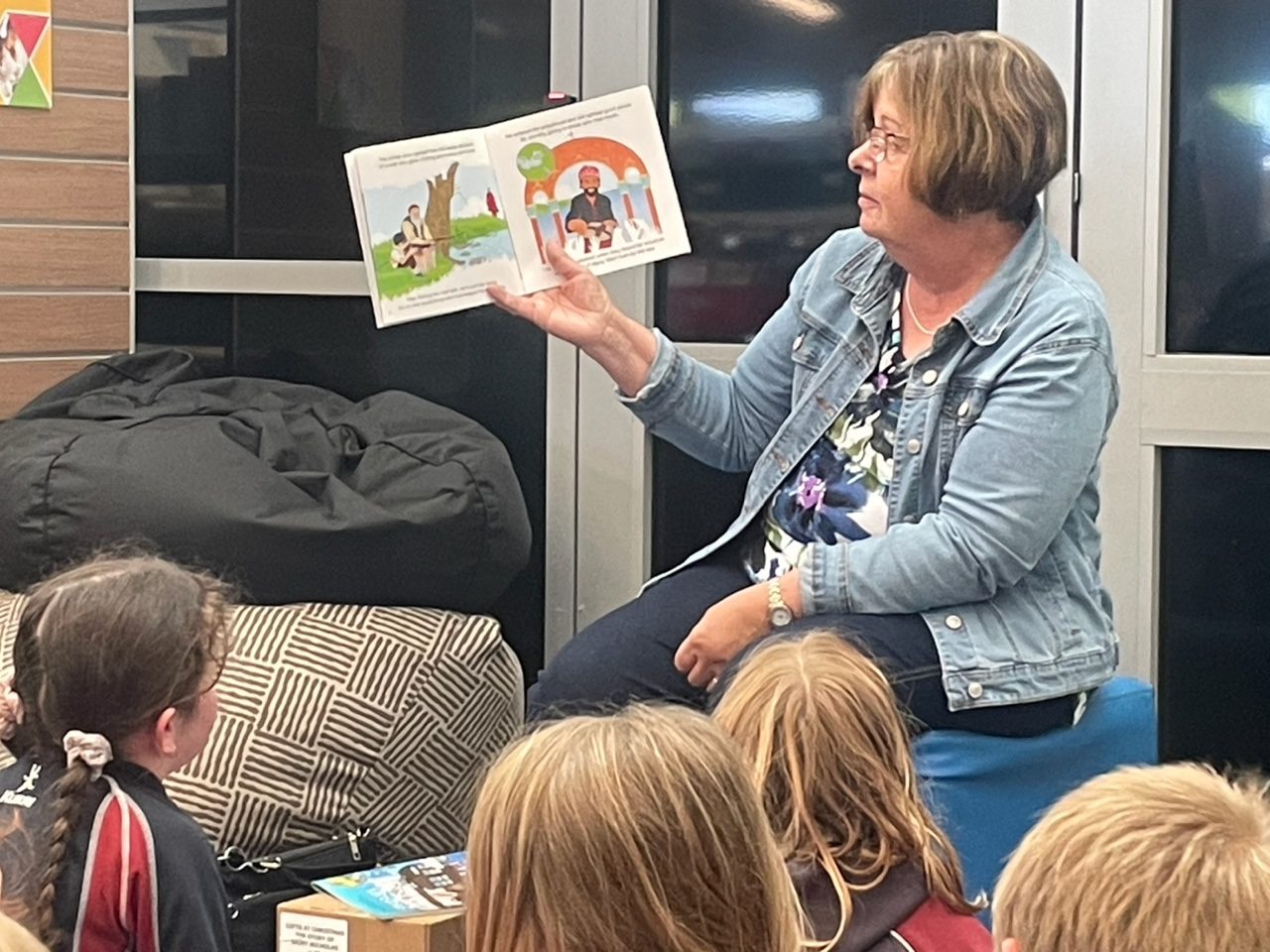
23 Nov, 2023 Storytelling – can restore the spiritual consciousness of a nation
Storytelling – restoring the spiritual consciousness of our nation
As the years have progressed I’ve ‘discovered’ the power of storytelling more and more.
- A free book on the topic is offered at the bottom of this short article – written 2023 – available as a PDF or as an audio book (under two hours)
- Also references to a range of books on our values history (where our cultural values came from) – while noting there are many more references in the appendices to the PDF of the book.
Image: Alison Condon (author of ‘Chronicles of Paki‘ NZ history series) at a public reading of ‘Gifts at Christmas – the story of Saint Nicholas‘ in a public library.
Jesus spoke through stories. Of note, he never explained the meaning of the parables to the crowds. Their interpretation was left to the audience to work out. He did this for a few reasons – including the presence of hostile elements in his audiences.
Our audiences increasingly now include potentially ‘hostile’ elements too. Public culture is being changed. This makes wise storytelling for public spaces a skillset we could value more, model and teach in our churches. This could help many to engage more confidently, gently restoring a spiritual consciousness to the environments they work within.
To illustrate:
If the topic were education, the story could be told of John Calvin who proposed an education system in which even the poor were taught to read and write. This was a radical new idea – the initial goal being access to the Bible so people could avoid the manipulations of a corrupted Church hierarchy. The story of the first school in NZ at Rangihoua (where Chief Ruatara invited Samuel Marsden in 1814) could then be told. Interestingly that first school taught in both Te Reo Māori and English, with both male and female students present. Forty more years on we could consider Hēni Te Kirikaramu (of the ‘Battle of Gate Pa’ fame) whose education positioned her for greatness. By age 16, living at a mission school in Auckland, she spoke Te Reo, English and French fluently, she was the administrator of the school, ran a boarding house for Māori students and was a full time teacher. Your concluding point to share: “Education opens opportunities for people. It’s got a great history and it’s important!”
To explain:
Even in a highly secularised environment these stories would be appreciated, and the concluding point agreed upon. However, what’s also been achieved is the revealing ofa clear connection between the Christian faith and the idea of ‘education for all’ in history. That awareness affects perspectives, and might later catalyse other conversations or questions.
A key in the approach of this example is the concluding statement, which says something everyone would agree with. For the contrast, responses would be considerably different were you to conclude with, “and that is why Christianity is so important to education”.
It is therefore possible to communicate Christian messages in secular places!
Six types of stories to consider
1. Our own life experience
2. Other people’s life experience
3. The natural world (reason, logic, science)
4. Our bicultural history
5. Our values history (freedoms, systems of justice/law, equality of races/genders, concepts of charity…)
6. The Bible.
We are reminded that ‘those who tell the history write the future’. If we’d like to see a spiritual consciousness being restored to public culture, the stories we tell can affect the perspectives of those who hear. Intentional storytelling is therefore an artform to consider, discover and value more – on all our platforms.
For more:
Book: ‘The Art of storytelling and of becoming in intriguing person’, by Dave Mann. Available for free as a PDF or audio book – AllTogether.co.nz/rationalfaith
DAVE MANN. Dave is a networker and creative communicator with a vision to see an understanding of the Christian faith continuing and also being valued in the public square in Aotearoa-New Zealand. He has innovated numerous conversational resources for churches, and has coordinated various national nationwide multimedia Easter efforts purposed to open up conversations between church and non-church people about the Christian faith and its significance to our nation’s history and values. Dave is the Producer of the ‘Chronicles of Paki’ illustrated NZ history series created for educational purposes, and the author of various other books and booklets including “Because we care”, “That Leaders might last” and “The Elephant in the Room”. Married to Heather, they have four boys and reside in Tauranga, New Zealand.




